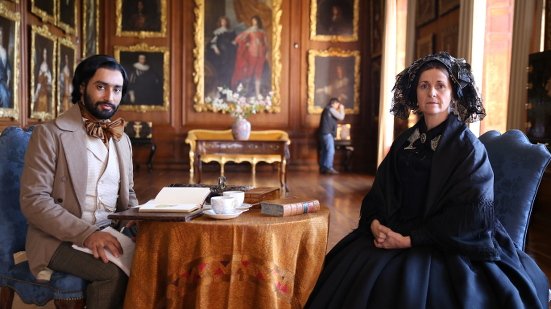
The film The Black Prince has been winning awards at various festivals in the West. It was also featured in Hollywood star Geena Davis’s film festival: The Bentonville Film Festival. The Black Prince is based on the life of the last Sikh kingdom heir Duleep Singh who was the son of the lion king of Punjab, Maharaja Ranjit Singh. After promoting the film at a sold out screening in Brampton, Canada, singer/actor Satinder Sartaaj shared his insights with Minority-Review’s Swati Sharan about bringing this period epic to life.
1. What was it like playing Duleep Singh?
It was a great experience.This was my most favourite character because I love history. I put in great effort for this opportunity. I joined acting classes. It was tough because it was a British period epic. Maintaining the mannerism and accent was quite difficult, but I got through.
2. Did you experience any challenges with portraying this character?
When a character is not loud, portraying him/her is difficult. When the character’s loud, you can define it easily. But the scriptwriting was so beautifully done that the story-telling just flowed. The director (Kavi Raz, read his interview here) also harnessed our efforts wonderfully.

Satinder and Amanda Root
3. But if you know something very sad is about to happen to someone and you have to act it out, might this sadness cause you pain?
You need to live the life of the characters you play when you do a film like this as the pressure is high because the whole bio-pic is centred on Duleep Singh. If you don’t do justice to it, the whole film will be ruined. So for this, I had to eat and live the character from morning to evening. I had to empathise with how he felt when his father died when he was 10 months old. And how he would have feel getting his kingdom at the age of five. Or being seperated from your mother at eight. At at 15, having your religion snatched from you and then being transported to a foreign land where you are in the midst of strangers. You’re then taught bad habits including womanising and hunting. You are made to forget your culture. You have to imbibe all those feelings so that they speak through your mannerisms and body language. So as I said earlier, I did acting classes for this and we had coaches on set who helped us enact the subtleties of the character.
4. Many Indians will have high expectations of your portrayal of a historic figure like Duleep Singh especially when there have been two TV serials made on Ranjit Singh. What are your thoughts on this?
Part of the reason for me being selected for this role was because I am linked with the same soil and language as Duleep Singh because the character needs to speak both languages fluently. And till the age of 16, he was in India.
But the TV serials that have been made on Ranjit Singh have been made by non-Punjabis. And some of what I feel is the problem with these is that the ‘looks’ don’t appear regional. The fake beards and turban styles don’t seem authentic. If something is produced in Mumbai, that authenticity doesn’t come out. Therefore Punjabis aren’t always able to connect with these serials.
Like there were many Sikhs who were present at this screening and they felt a great authenticity in the depiction of the story because the characters were selected with great care. Many auditions were held for the various roles. So you actually feel like you are in the 19th century. We’ve had five screenings at different festivals and we got awards for acting, art, film and direction.

A scene from The Black Prince
5. How were you selected for the role?
I am basically a poet-composer-singer. We’ve done many shows in North America so I am relatively well-known in this community. Especially in Los Angeles and the Sikh community in California where I have very strong connections. They are wealthy people. Like in the mainstream, there was a film called November Man with Pearce Brosnan and the main producer was a Sikh guy. And many in this community were of the notion that Duleep Singh’s life was largely in the dark. People knew very little about him or they had inaccurate notions about him. They wanted to do something by which our history was revived. So that’s how this started and the same production house which produced 12 Years A Slave got on board. When the inital meetings happened, casting was discussed. And as they surveyed group members for suggestions of who to cast for this, someone suggested that I had a similar air and personality to play this role. So that’s how I got called and auditioned. I wasn’t an actor but the director believed that I could do it.
6. One hears of Sikh settlements in California since the 1800s. What’s Sikh history like there?
Sikhs have settled there since 1893. They are amongst the earlier Sikh settlers. They have their unique history. So accordingly, their businesses and communities are very strong.
7. So what did you think of the Sikh community there?
I felt that the Punjabis who live outside of India are more Punjabi than us. We in Punjab are more affected by western ideas whereas Sikhs here are more strongly Sikh and believe in the Guru Granth Sahib. Like yesterday, when we were at the screening, many of the audience members had very strong leanings towards Sikhism. So they just came to see if due justice was paid to the character.

8. How was the film received?
For Sikhs or Punjabis, it’s based on a global character in the British realm. So when the screening happened in Manchester, we got a very great response from the audience because they could relate with the story as it took place in England. We got the best film award there. At the London Film Festival, I got the award for best newcomer. We got best film in Houston and best art direction in San Diego. Shabana Azmi and Director Saahib (Kavi) also won awards. So I think we’re doing very well.
9. When will the film release in India?
We have one worldwide release and that’s July 21.
10. Will this be released in metros only or all over India?
It will be in the villages also because we dubbed in Hindi and Punjabi also. So it will be released in India in three languages. It’ll come out everywhere from New Zealand to New York much like how Hollywood films are released.
Watch the trailer here:



0
comments